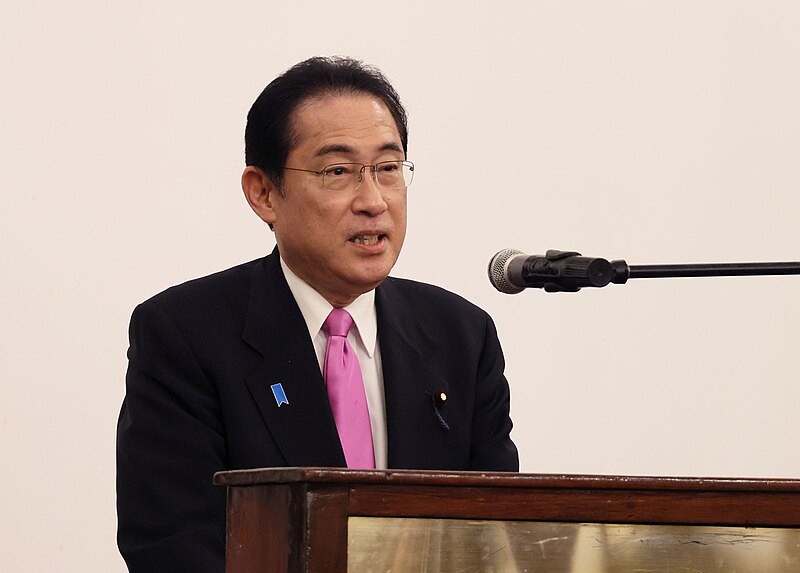Japanese Prime Minister Fumio Kishida said there would be no tax increases to fund the government’s childcare policy. The policy comes as Tokyo looks to find a solution to the country’s declining birth rate.
On Monday, Kishida said during a government panel meeting with private sector experts in attendance that tax hikes would not fund the childcare package that aims to address the declining birth rate in the country. Japanese economy minister Shigeyuki Goto told reporters that the government will present draft guidelines to implement the childcare measures at the next meeting with the panel.
“I’m not considering imposing new tax burdens, including sales tax hikes, to secure sources of funding childcare support,” said Kishida, who has sought to double childcare spending to address Japan’s declining birth rate. The proposed measures, which were unveiled in March, would make it easier for parents to work and fairly divide household chores.
The proposed childcare policy would take place over a span of three years, but the government has yet to specify how the policy would be funded.
According to Japan’s Nikkei Daily, some proponents of securing stable funding suggested the possibility of creating a new special budget account aside from the state general account budget that would manage spending related to childcare funding reforms. The new account would reportedly be created through a partial merger of two existing accounts and would be run by the childcare agency, and would have greater flexibility in earmarking spending.
The new account follows 13 other special budgets that Japan already has in place.
Over the weekend, China summoned the Japanese ambassador to protest against what Bejing has referred to as the “hype around China-related issues” and the G7 summit in Hiroshima. This comes as the leaders of the G7 countries have expressed concerns about the flared tensions in both the East and South China Seas, as well as human rights concerns in China, such as the situation in Tibet and in Xinjiang.
Beijing said Japan collaborated with other countries at the summit “in activities and joint declarations…to smear and attack China, grossly interfering with China’s internal affairs, violating the basic principles of international law and the spirit of the four political documents between China and Japan” referring to the 1972 China-Japan Joint Communique.
Photo: Kantei.go.jp/Wikimedia Commons(CC by 2.0)



 Netanyahu to Meet Trump in Washington as Iran Nuclear Talks Intensify
Netanyahu to Meet Trump in Washington as Iran Nuclear Talks Intensify  US Pushes Ukraine-Russia Peace Talks Before Summer Amid Escalating Attacks
US Pushes Ukraine-Russia Peace Talks Before Summer Amid Escalating Attacks  China Warns US Arms Sales to Taiwan Could Disrupt Trump’s Planned Visit
China Warns US Arms Sales to Taiwan Could Disrupt Trump’s Planned Visit  U.S.-India Trade Framework Signals Major Shift in Tariffs, Energy, and Supply Chains
U.S.-India Trade Framework Signals Major Shift in Tariffs, Energy, and Supply Chains  Jack Lang Resigns as Head of Arab World Institute Amid Epstein Controversy
Jack Lang Resigns as Head of Arab World Institute Amid Epstein Controversy  Trump Signs Executive Order Threatening 25% Tariffs on Countries Trading With Iran
Trump Signs Executive Order Threatening 25% Tariffs on Countries Trading With Iran  U.S. Lawmakers to Review Unredacted Jeffrey Epstein DOJ Files Starting Monday
U.S. Lawmakers to Review Unredacted Jeffrey Epstein DOJ Files Starting Monday  Trump Endorses Japan’s Sanae Takaichi Ahead of Crucial Election Amid Market and China Tensions
Trump Endorses Japan’s Sanae Takaichi Ahead of Crucial Election Amid Market and China Tensions  Trump Backs Nexstar–Tegna Merger Amid Shifting U.S. Media Landscape
Trump Backs Nexstar–Tegna Merger Amid Shifting U.S. Media Landscape  Nighttime Shelling Causes Serious Damage in Russia’s Belgorod Region Near Ukraine Border
Nighttime Shelling Causes Serious Damage in Russia’s Belgorod Region Near Ukraine Border  U.S. Announces Additional $6 Million in Humanitarian Aid to Cuba Amid Oil Sanctions and Fuel Shortages
U.S. Announces Additional $6 Million in Humanitarian Aid to Cuba Amid Oil Sanctions and Fuel Shortages  U.S. to Begin Paying UN Dues as Financial Crisis Spurs Push for Reforms
U.S. to Begin Paying UN Dues as Financial Crisis Spurs Push for Reforms  Missouri Judge Dismisses Lawsuit Challenging Starbucks’ Diversity and Inclusion Policies
Missouri Judge Dismisses Lawsuit Challenging Starbucks’ Diversity and Inclusion Policies  New York Legalizes Medical Aid in Dying for Terminally Ill Patients
New York Legalizes Medical Aid in Dying for Terminally Ill Patients  Trump Says “Very Good Talks” Underway on Russia-Ukraine War as Peace Efforts Continue
Trump Says “Very Good Talks” Underway on Russia-Ukraine War as Peace Efforts Continue  TrumpRx.gov Highlights GLP-1 Drug Discounts but Offers Limited Savings for Most Americans
TrumpRx.gov Highlights GLP-1 Drug Discounts but Offers Limited Savings for Most Americans  Japan Election 2026: Sanae Takaichi Poised for Landslide Win Despite Record Snowfall
Japan Election 2026: Sanae Takaichi Poised for Landslide Win Despite Record Snowfall 































